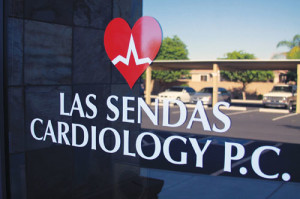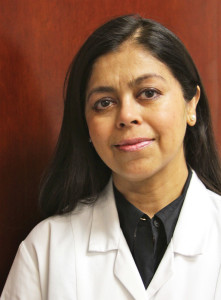 After six months in practice, Las Sendas Cardiology has been well received as a valuable patient service.
After six months in practice, Las Sendas Cardiology has been well received as a valuable patient service.
Dr. Afroze Ahmad, the doctor who takes the extra time to listen, has reset the healthy living rhythm for a number
of patients.
“I am surprised to see, in Las Sendas, comparatively younger people with heart trouble,” Dr. Ahmad remarked. “These patients lead a healthy, active lifestyle, follow good habits, are nonsmokers, and they still encounter heart disease.”
The good thing is this group of people takes charge of their health. They don’t wait for the obvious symptoms, but request proactive screenings.
“Younger people, actually, people at any age, need to be aware of their family history of stroke and other illness,” the doctor advised. Some patients seek out Dr. Ahmad’s consult when they approach an age bracket, which escalated heart problems in other family members. However, in the light of prevention, they should not wait that long.
“The presentation of stroke, for example, eludes the general population,” explained Dr. Ahmad. “The symptoms, caused by a blood clot or rupture of a blood vessel in the brain, happen suddenly.”
Strokes come without a warning, and are not preceded by pain. Individuals with heart disease, for example, those who experience atrial fibrillation, are more at risk for strokes, and must increase their awareness.
“Signs of stroke are numbness of the limbs, slurred speech, non-steady gait, cognitive impairment and abnormal vision,” Dr. Ahmad described. “No premonition or pain is evident.”
If you experience these symptoms, seek help immediately. The time window for stroke management is very small. In Dr. Ahmad’s clinic, some patients realized, in hindsight, they might have had a transient stroke. Their CT scans told
the story.
Some commonly recognized risk factors for stroke are smoking habits, birth control pills, and diabetes. If a diagnostic image shows blood clots, the doctor may advise taking aspirin or prescribe blood-thinning medications.
“People up here in Las Sendas hike quite a bit,” Dr. Ahmad stated. “A hiker may experience leg pain and blame arthritis or a pulled muscle for it. But in some cases, this pain can be a harbinger of a blockage in a leg artery.”
At Las Sendas Cardiology, any concerns are thoroughly evaluated. Patients find out about the clinic through the Up Close newspaper or by word of mouth.
“It’s a small world,” Dr. Ahmad said. “One of my patients, who relocated from Bismarck, N.D., was referred to me by her friend living here.”
“Some people call because of an indeterminate feeling in the chest,” said medical assistant MiShelle DeMoss. “We can do all the necessary tests at the clinic, and keep the patient all in one place.”
Paradoxically, a false alarm of heart trouble may realign health awareness. “We evaluate how to find solutions for preventing a future stroke or heart failure,” explained MiShelle. “It’s a great success if we can lower blood pressure or cholesterol.”
“One of our patients who strictly followed Dr. Ahmad’s advice showed awesome blood work,” MiShelle recalled. “She also stopped smoking, as did two other patients. We have had really good feedback on explaining the hazards for heart disease.”
With every diagnostic modality all in one place, the full-service Las Sendas Cardiology Clinic allows patients to maximize their time and benefit. A thorough differential diagnosis always includes lifestyle and nutrition assessments.
“Our patients appreciate the time we take in explaining so many treatment and prevention options,” said MiShelle. In a pleasant atmosphere with persistent coaching, patients make a lot of progress toward a healthy heart.
For appointments, or to find out more about Las Sendas Cardiology, call (480) 361-9949.
Ensure Healthier Hearts Through Personal Coaching
Cardiologist Dr. Afroze Ahmad has about a dozen certifications from preeminent medical institutions and specialty training. Her foremost concern, however, is the patients and how their life circumstances (depression, mobility) interact with their heart health.
The Doctor’s Approach
• Make a diagnosis to confirm or rule out heart disease.
• Prescribe the most appropriate treatment course, and advise for maintenance.
• Provide proper reassurance, and counsel patients on prevention.
The Extra Mile of Prevention
Dr. Ahmad observed that it is “… sometimes easier to change somebody’s religion than it is to change their eating habits.” So, she asks her patients persistent questions about nutrition.
For example: A patient has high triglycerides, but apparently is following a healthy lifestyle. So, what about all those apples, bananas and oranges? High in sugar, better to have nuts or low-fat cheese for a snack.
For example: An older patient seems not to eat his vegetables. Why is that? He has arthritis, can’t make it to the store, and his hands hurt too much when preparing vegetables. The answer is frozen vegetables.
Change is not easy, Dr. Ahmad realized. “You simply can’t impose a regimen on a person, which is all too different from their nature. I like to understand a person’s routine, and then come up with a personalized coping strategy.”


